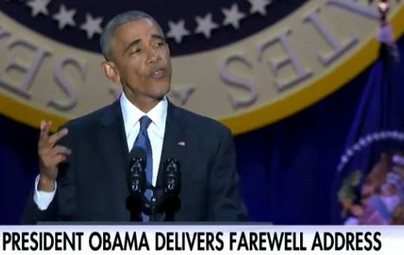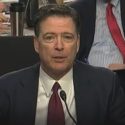Obama’s Farewell Address a Campaign Rally in Disguise
Barack Obama formally ended his presidency the way he came in, talking to adoring fans about how lucky we are to have him in our lives.
Indeed, given the hand-wringing over how Obama’s successor is all about entertainment and theatrics, it was somewhere between ironic and absurd to watch the outgoing president hold a campaign rally for his “farewell address.”
And yet, we’ve become so inured to this kind of self-serving pomp and circumstance that no one seems to care. From what I can tell, no liberal commentators minded at all, and most conservative reviewers went straight to the substance — or lack thereof — of Obama’s remarks.
I’ll get to that. But it’s worth pointing out the gaudy grotesquerie of the spectacle, because it highlights not only how low we have sunk, but the depths to which we may yet plunge given how Obama helped further transform the presidency into a totem in the culture wars.
The first presidential farewell address, and the standard for all to follow, was given by George Washington. It was “given,” not delivered, in that it was written out and published as a letter to the American people in the American Daily Advertiser under the title “The Address of General Washington to the People of the United States on his declining the Presidency of the United States.”
James Madison helped write the first draft toward the end of Washington’s first term. When Washington decided to run for a second term, it was put aside. When he opted not to run for a third term, he gave it to Alexander Hamilton to revise.
With a bullpen of writers like that, it’s no wonder that Washington’s farewell ranks among the great works of literary statecraft, but the most remarkable thing about it was that it was given at all. To voluntarily relinquish power — power Washington never wanted in the first place — for the benefit of democracy was one of the most radical acts of political humility in history.

During the Revolutionary War, King George III asked the American painter Benjamin West what Washington would do if he won independence for the colonies. West replied, “They say he will return to his farm.”
George was stunned: “If he does that,” the king replied, “he will be the greatest man in the world.”
Few presidents dared to invite comparisons to Washington until the populist egotist Andrew Jackson opted to write his own letter to the American people. It was the longest presidential farewell ever, coming in at more than 8,000 words.
Of course, the era of radio and television necessitated — or created the perception of necessity — that presidents address the people directly. Whether that amounted to progress is for others to decide. But until Obama, it never occurred to a president to deliver a televised address from anywhere but the Oval Office.
Obama, who has said he’d love to run for a third term if he weren’t barred from doing so (thanks to FDR flouting the Washingtonian tradition of serving only two terms, forcing Congress to amend the Constitution), went a different way. He did the next best thing and held a campaign rally as if he were running again. Obama is never more comfortable than when he’s in front of an audience that already agrees with him and shares his stunning self-regard, which helps explain why his was the longest televised presidential farewell ever.
The whole speech seemed written to be the final chapter of the “Collected Speeches of Barack Obama,” which is why he concluded by referencing his 2008 “Yes We Can” speech.
No wonder the substance of Obama’s farewell was a high-flown rehash of his greatest hits. He spoke again of Congress being “dysfunctional” in the abstract, but what he surely meant is that Congress isn’t working properly when it declines to do what he wants it to do. Hence the insinuation that disagreement with his views on climate change is contrary to the “spirit” of America and the Enlightenment. He called for a “new social compact” that was indistinguishable from his legislative agenda and insisted that the essence of democracy is the commitment “that we rise or fall as one.”
That is not the spirit of democracy at all; it’s the spirit of the “tribalism” and “nationalism” he’s come to disparage. But that has always been the spirit of Obamaism. When people agree with him, that’s democracy working. When democracy rejects his counsel, that’s the bitter Bible-clingers rejecting the better angel of his nature.




